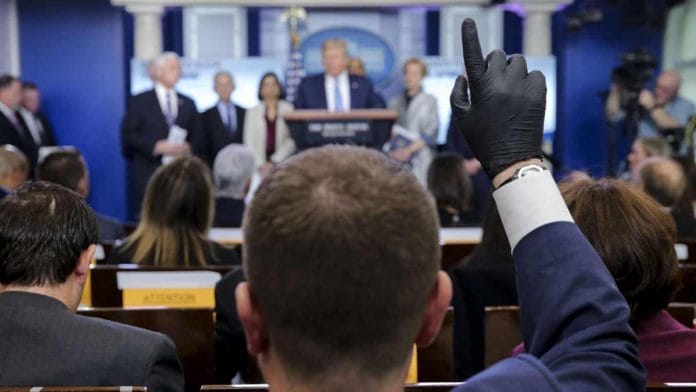New Delhi: Who in the US has the power to lift the restrictions in place and begin the country’s return to normalcy — the president or state governors?
President Donald Trump’s Monday press briefing on Covid-19 threw up this question after he declared that he, unlike the governors of various states, had unilateral authority over when restrictions would be lifted and the economy restarted.
Just hours later, various states announced their plans to band together in regional groupings and coordinate their timeframes for lifting the lockdown restrictions. Two such groupings have come up on the East and West coasts.
“We have a constitution, we don’t have a king,” Andrew Cuomo, the Governor of New York reportedly said, adding that the president doesn’t have total authority. Cuomo said the decision to reopen public spaces such as schools and businesses needed to be made locally. If done too early, it could lead to more infections and deaths.
New York City (1.95 lakh) alone has the most number of Covid-19 cases in the world, higher than China (82,249) and UK (93,873). The US also has the world’s highest number of Covid-19 deaths. Currently, there are over 19 lakh cases globally, of which 5.87 lakh are in the US.
The divergence in rhetoric of the US President and that of the governors raised questions about the country’s federal structure of governance. More specifically, it is raising questions regarding who has the authority to lift restrictions.
Also read: Does Donald Trump have the authority to cancel or postpone 2020 US presidential election?
What the US Constitution says
The US Constitution establishes a federal structure where the country has a system of “dual sovereignty”. Article VI argues that while state governments will surrender some of the powers to the federal government, they will also retain sovereignty in other matters.
Article VI also outlines the “supremacy clause”, which states that when there is a conflict between federal and state laws, the federal laws will supersede those of the states.
But, if one looks at the fine print pertaining to restrictions and restarting economic activity, state governments seem to have complete authority in the matter.
According to the Tenth Amendment of the US Constitution, the states have the “police power”.
“The Tenth Amendment reserves powers to the states, as long as those powers are not delegated to the federal government. Among other powers, this includes creating school systems, overseeing state courts, creating public safety systems, managing business and trade within the state, and managing local government. These powers are referred to as reserved powers,” notes Cornell University’s Legal Information Institute.
Thus, because there are no existing federal laws on when to lift restrictions, the state governors would have the authority to decide their own course of actions.
While Trump has declared Emergency Powers, those only include decisions to do with military spending but not authority over lifting lockdowns.
Most legal experts also contend that states get the final say, but the Trump administration has continued to argue otherwise. This could potentially lead to a future constitutional battle.
Also read: Most New York city coronavirus cases came from Europe, genome researchers say
States versus Trump
In the face of President Trump’s threats to forcibly lift restrictions and re-start state economies, governors have already announced their alternative course of action.
Of the two groupings of state governments that have come up, the East coast comprises of New York, New Jersey, Connecticut, Pennsylvania, Rhode Island, Delaware and Massachusetts.
These East Coast governors interacted over a conference call and decided to coordinate their responses going ahead.
“Everyone is very anxious to get out of the house, get to work and get the economy moving. Everyone agrees with that, but the art form here is going to be doing that smartly, doing that productively, and doing that in a coordinated way,” said Cuomo after the conference call, according to The Washington Post.
On the West coast, California, Washington, and Oregon came together and announced a pact to tamp down the restrictions and carefully reopen their economies.
“We are announcing that California, Oregon and Washington have agreed to work together on a shared approach for reopening our economies — one that identifies clear indicators for communities to restart public life and business,” noted the joint statement.
Also read: Coronavirus won’t make Trump lose. That’s what modern history tells us






